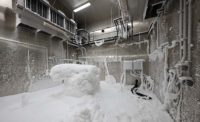The cannabis industry is growing quickly as more states legalize marijuana for both medicinal and recreational use. And the industry has a high demand for HVAC services. More and more contractors are stepping forward to meet that need, and as with any new field, contractors need to make sure they are prepared for the specific needs and challenges it requires.
Advance Air in Freetown, Massachusetts, entered the cannabis industry a few years ago. The state fully legalized marijuana use in 2016. Advance Air President Karen DeSousa said the firm had a long history of commercial work, serving food distributors, specialized manufacturers, and surgery centers. This gave them experience in meeting specific environmental parameters — such as temperature, humidity, and air quality — in order to avoid negative impacts to patient health, product, income, and time.
“Our background in these other areas makes the cannabis industry a natural progression for our team,” DeSousa said.
It’s a similar story for others in the business. Northern Weathermakers, an HVAC firm located in Northbrook, Illinois, worked on clean rooms and surgery centers before it started servicing the cannabis industry. Los Angeles-based Critical Climates Inc. had a background in data centers. Owner Markus Kashinsky said he entered the field when contacted by a client they had worked with on a yoga center.
Grow Facilities Are Demanding Environments
Kashinsky said grow centers are some of the most demanding environments to try to condition. The environment changes day to day and throughout the growth cycle of the plants. Grow facilities lack a static load, as the living contents constantly change the conditions by expelling up to 85 percent of the water they consume. As a result, the chances of a failure are high, so Climate Controls has to run full emergency service. Also, the high moisture increases the risk of fungus developing, and HVAC workers need to use caution so they don’t spread something that can destroy thousands of dollars’ worth of crops. The plants require intense lighting to replicate sunlight, said Mike Lee, president of Northern Weathermakers. This impacts the temperature as well.

KEEPING IT CLEAN: Like surgery centers and clean rooms, cannabis grow facilities require exact humidity control to avoid fungus outbreaks that can kill thousands of dollars’ worth or crops.
Lee said one of the biggest issues he faces with jobs involving marijuana grow facilities is odor control. Cannabis emits an extremely pungent smell, and this arises as the biggest objection among neighbors during the vetting of a proposal. Lee said HVAC contractors must assure their clients that they will be able to control the smell.
Adding to the challenge, all this work needs to finish in a short amount of time, Lee said. The licenses granted in many states place a strict deadline for opening a facility. The upside of this is operators often open only what they need and leave room for growth, leaving future work for HVAC contractors. As the cannabis business matures, it’s becoming more professional, and Kashinsky said he’s seeing more facilities built for the long term.
Taking the Long View of the Cannabis Business
The cannabis business today resembles the dot-com industry of the 1990s. Players emerge daily, and the publicly traded companies have been on a wild ride on Wall Street. Kashinsky said he expected a building boom when California’s recreational regulations went into place. That didn’t happen. Instead, shops opened without any cultivators licensed to supply them. This caused issues with Climate Control getting paid, since the customers found themselves without any cash flow.

HEAT AND LIGHT: Grow facilities require large amounts of artificial light. In addition, the plants give off their own heat. This creates challenges in temperature control.
Still, DeSousa sees long-term potential in the marijuana industry. She said working with companies on their initial set-ups can lead to relationships for ongoing emergency service and maintenance.
“Starting a relationship from installation and carrying it through to ongoing care and maintenance is a way to ensure quality and longevity right from the start,” DeSousa said.
The cannabis industry remains entrepreneurial. Lee said he gets most of his work through word-of-mouth.
He also speaks at a lot of events, including trade shows and roundtables. Early on, Lee learned whom he needs to impress at the cultivation facilities — the growmaster. This person functions like a brewmaster or a vintner at a winery.
“It’s really the grower who is in control,” Lee said. “They carry more weight than the CEO of the company because they’re responsible for the product.”
President, Advance Air
Local Knowledge Helps HVAC Contractors Adapt Their Plans
DeSousa said finding qualified engineers who understand the requirements of the business to do initial designs proves the most challenging part of working with cannabis customers.
“In Massachusetts, these facilities did not exist before a few short years ago, so the engineering and code is new to us,” she said. “From the perspective of the HVAC installer, we’ve got the easy part. Once designed, we have the experience and knowledge to install and make sure that it performs to specifications.”
One issue Lee runs into is that many of the engineering design firms are located out West. They often lack the local knowledge to adapt their plans for less moderate climates.
DeSousa said having qualified, experienced estimators, technicians, and supervisors to ensure consistent quality on every job requires careful planning, scheduling, and coordination. She said Advance Air looks for well-planned projects where it can partner with a professional engineering firm with experience and a great reputation.
“We want to team up with companies that have the same quality standards as we do because we want to partner with them into the future, not just on one installation project,” she said. “My advice to HVAC contractors looking to get involved in the cannabis industry would be to find an engineering firm with knowledge and experience and become their partner in assisting with design and implementation. Build those relationships.”











